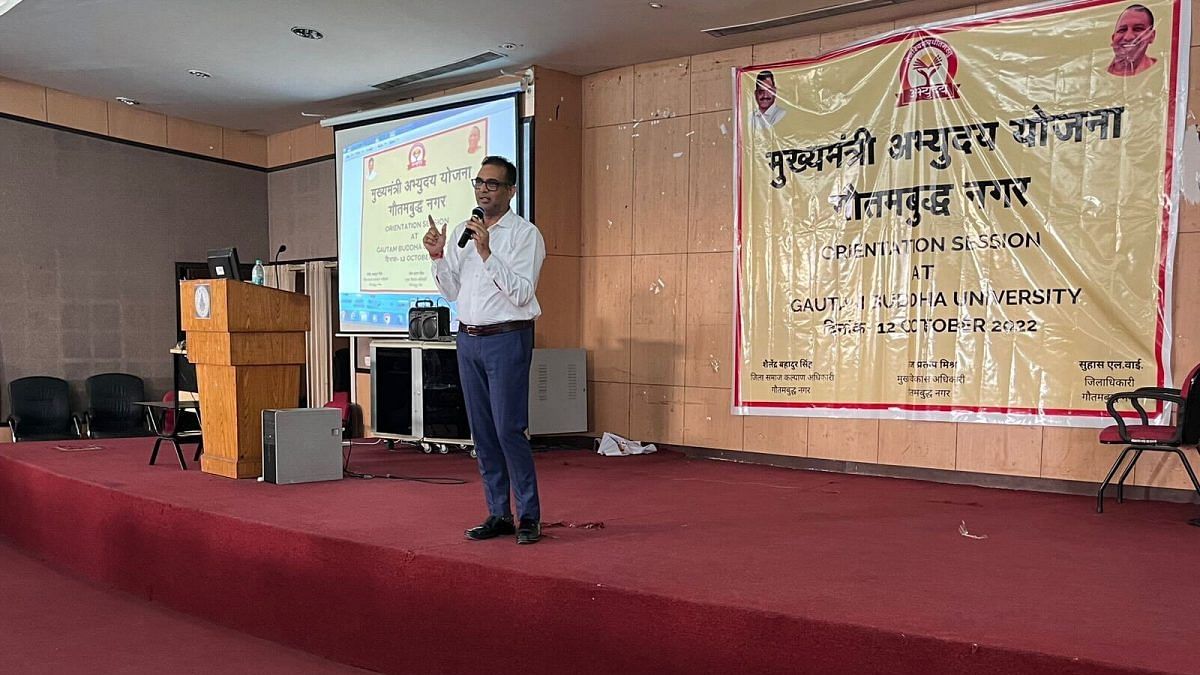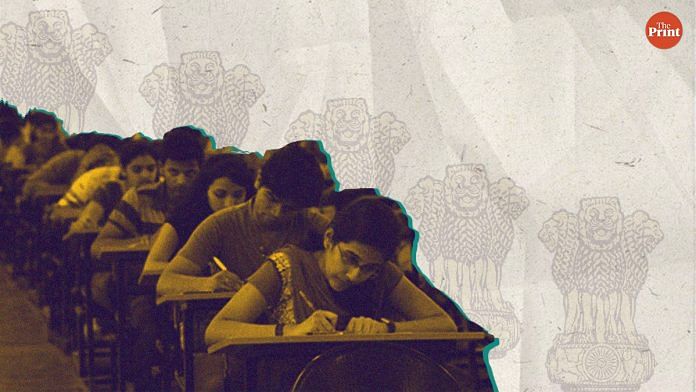Private UPSC coaching centres are part of an estimated Rs 3,000 crore industry in India, and many of the tutors are insanely popular among aspirants and have even become YouTube influencers. But the exorbitant fees deter poorer students from aspiring for the coveted UPSC spot. Now, more and more state governments are trying to get a say in it.
West Bengal, Uttar Pradesh, and Delhi are just some of the state governments that are running their own UPSC coaching centres — not as businesses but as a strategy to diversify the pool of aspirants. It’s advantage students too — free classes and study material, and teaching by serving IAS officers.
And it seems to be working.
Twenty-year old Diksha Singh walks 2-3 kilometres from her house in Jewar’s Rampur Bangar to reach the bus stop that will take her to the Noida UPSC coaching centre opened under the Mukhyamantri Abhyuday Yojana launched by the Yogi Adityanath government in Uttar Pradesh in February 2o21.
“My father is a farmer. Our family cannot afford private coaching for UPSC,” said Diksha, a BCom student of Delhi University’s School of Open Learning. Diksha has been taking classes at the centre since August, using the time saved from DU’s distance learning mode to prepare for UPSC and join the coveted ranks of the Indian Civil Services.
Today, more than 10 states in India are either running affordable UPSC coaching centres or offering merit-based scholarships to the underprivileged.
“All governments want to see more and more students from their state become civil servants, and increase representation. That is why every state is now coming up with such schemes,” said retired IAS officer TR Raghunandan.
While Maharashtra began this in 1976 and Kerala in 1989, states like Delhi, Uttar Pradesh, Karnataka, Gujarat, Rajasthan, and West Bengal have joined the trend in recent years.
In May 2022, UP opened two centres with 500 students — one at the Gautam Buddha University in Greater Noida and the other at IIMT in Noida. None of the students has given the UPSC (Prelims) yet, but 40 made it through the Uttar Pradesh Public Service Commission examination last year.
It’s early days yet, but for aspirants like Diksha, the centre offers a fighting chance in one of India’s most coveted and competitive exams.
Institutes like these are providing a much-needed competition to the huge and exorbitant private UPSC tuition industry that has dominated the market for years with centres such as Vision IAS, Drishti, Insights, etc.

Also read: An ‘affordable’ UPSC dream is taking off in small-town India. It can change the steel frame
Facilities, teachers on equal footing
Five days a week, about 200 students gather at the auditorium in Gautam Budhha University. With heavy bags slung over their shoulders, they walk on the red carpet spread out in the hall towards the blue and yellow sofa-like chairs. It’s an imposing air-conditioned glass and wood structure with digital boards—a different world from the schools and colleges they are used to.
“Sometimes, it’s like we are sitting in a cinema hall and attending some big-shot event,” said 20-year-old Ragini Kumari. The clean washrooms and drinking facilities are a draw. “Studying in such comfortable areas with big windows makes us feel good.”
Like Diksha, Ragini submitted her application when she read about the centre on her college notice board and was thrilled when she was selected. Diksha, who goes to the IIMT centre, wasn’t sure how good the coaching would be.
“Because it’s free, I thought it wouldn’t be as good as private coaching classes. But once I started, I realised that the government matches almost everything to private coaching. From air-conditioners to sitting space, nothing feels compromised,” she said.
But for both students, it’s the quality of teaching that stands out. “They clear our doubts and answer every question,” said Ragini, a political science honours student.
Getting good teachers is a challenge because states cannot afford to pay the kind of salaries that private coaching centres do. Under the Abhyuday Yojana, the UP government has rolled out free coaching centres in all 75 districts of the state. Seventy of these centres are currently operational and hold physical classes, though a few offer hybrid models. The average student enrollment in each district centre is around 50-100.
Gautam Buddha Nagar district magistrate Suhas Lalinakere Yathiraj, who supervises both the Noida and Greater Noida centres in his jurisdiction, admits that they are trying to get more skilled teachers.
“A coaching is made great by its teachers. Information is easily available, but we tell students how to approach it.” he said. For now, 20 instructors, from over a hundred submissions, have been empanelled for the two centres.
Instructors come from “reputed” institutions, said Deepanshu Singh, district coordinator, UP’s Abhyuday Yojana. The platform offers free coaching not just for UPSC but other competitive examinations such as JEE (engineering) and NEET (medical) as well.
Rinku Singh has coached IAS aspirants at Unacademy, Dhyeya IAS and other institutes. Now she teaches at the IIMT centre and earns Rs 2,000 for 1.5 hours. Private coaching institutes pay her as much as Rs 5,000-10,000 for the same number of hours.
“Teaching at Abhyudaya gives a different kind of satisfaction. These kids also deserve a good teacher, a fair chance to run in this UPSC race.” Rinku teaches history, art, and culture.
UP’s Abhyuday Yojana is perhaps the most ambitious state-run initiative in India, but it’s not the first.
Also read: YouTube is the new Mukherjee Nagar for UPSC students. Tutors are influencers
Different states, different models
Most states follow two types of models–one where they provide free or subsidised coaching in government-run institutes. And in the other, they sponsor the student’s fees in a private institute. But it’s the first model that appears to be making the most impact.
In West Bengal, students are charged Rs 500-Rs 1,000 a month for an approximately year-long course at the Satyendra Nath Tagore Civil Services Study Centre (SNTCSSC) in Kolkata, launched in 2014 by Chief Minister Mamata Banerjee. The fees cover hostel accommodation, coaching and study material.
Most of the students come from rural areas like Bakkhali and Birbhum, and could never afford private institutes that charge as much as Rs 1.5 lakh annually. Faculty include instructors from established coaching institutes such as Khan Study Group. “We have an offline centre in Kolkata where 200 students are enrolled,” said Jitin Yadav, course director, SNTCSSC.
There are 26 ‘satellite’ (online) centres in 22 districts across West Bengal where classes are held five days a week. Around 50 students are enrolled in each centre.
States that run their own centres, such as Maharashtra and West Bengal, conduct entrance examinations similar to the UPSC Prelims. Uttar Pradesh does not, but has a set of basic criteria for admissions. The priority is to get qualified teachers, improve infrastructure and attract more students.
Another model adopted by state governments are scholarship and sponsorship schemes for students from poor and backward families. It’s the route Delhi has taken under the Jai Bhim Mukhyamantri Pratibha Vikas Yojana, which sponsors students from the Scheduled Caste (SC) and Scheduled Caste (ST) category as well as those from economically weaker sections of society.
Instead of running coaching centres, the scheme pays for the expenses of selected students so that they can enroll in top empanelled institutions such as KD Campus Pvt Ltd and Sachdeva Colleges Ltd to prepare for entrance examinations. At the time of its rollout, the Delhi government partnered with 46 private coaching centres.
But the Jai Bhim scheme is not without hiccups. Last year, students protested saying that they hadn’t received the Rs 2,500 stipend. Many alleged that they had been asked to leave the coaching institutes they got a seat in because the government had not paid the dues.
Rahul Tomar was ecstatic when he was selected for sponsorship in 2021.
“But then after a few months, the coaching people said that they did not get the money from the government and our classes were stopped. Now I am studying through online videos,” said Tomar, who did not want to name the coaching institute he was enrolled in.
ThePrint tried to contact the officer handling the scheme but did not receive any response till the time of publishing the story. The government website has no new information regarding 2023-24.
Serving officers that ThePrint spoke to stressed on the need for more government-sponsored initiatives to increase Bengal’s representation in civil services.
“The coaching provided by the Maharashtra government has resulted in increasing Marathi percentage in IAS, IPS, IRS and all other services. In recent batches, an average of 10% IAS officers come from Maharashtra,” says IAS officer Archana Pandharinath Wankhede (Bengal 2019). Wankhade studied at Ambedkar Competitive Examination Centre of Yashada in Pune, Maharashtra, which launched the State Institute for Administrative Careers (SAIC) in 1976 that today runs centres in Kolhapur, Amravati and Aurangabad districts.
Also read: ‘What Next’ for UPSC-negatives? Indians with wasted youth don’t want to return empty-handed
It comes down to results
Every year, private coaching institutes sell the faces of successful students to the lakhs of young men and women who dream of becoming IAS officers. They flaunt such ‘success stories’ in huge hoardings along the streets of Delhi’s Karol Bagh and Mukherjee Nagar.
Government-run coaching institutes don’t market themselves so overtly, but want to be part of this narrative. They just haven’t jumped on the PR and advertisement bandwagon—yet.
The UP government promises students access to serving officers. Its initiative claims to have over 500 IAS, 450 IPS and 300 IFS officers besides subject experts, according to a report in The Times of India.
“One of the best features of the scheme is the motivational lectures by serving officers and retired bureaucrats to guide aspirants. Recently, we also organised mock interview sessions with eminent panellists,” said district coordinator Singh.
The coaching industry can be as cut-throat as the examination itself. Students want to enrol in ‘good’ institutes, and often government-run coaching classes are not the preferred choice. In Noida, DM Suhas wants to change that perception.
“We want results. Once the results start coming, the number of children will automatically start increasing,” he said.
This feature is part of a series called Affordable UPSC. You can read all the articles here.
(Edited by Prashant)



